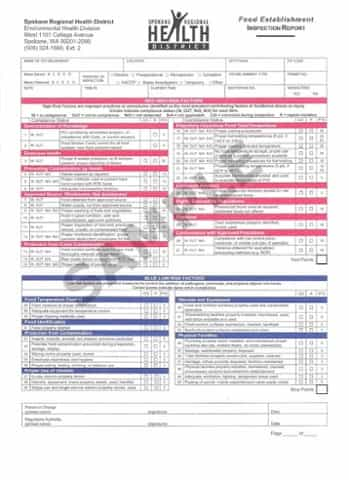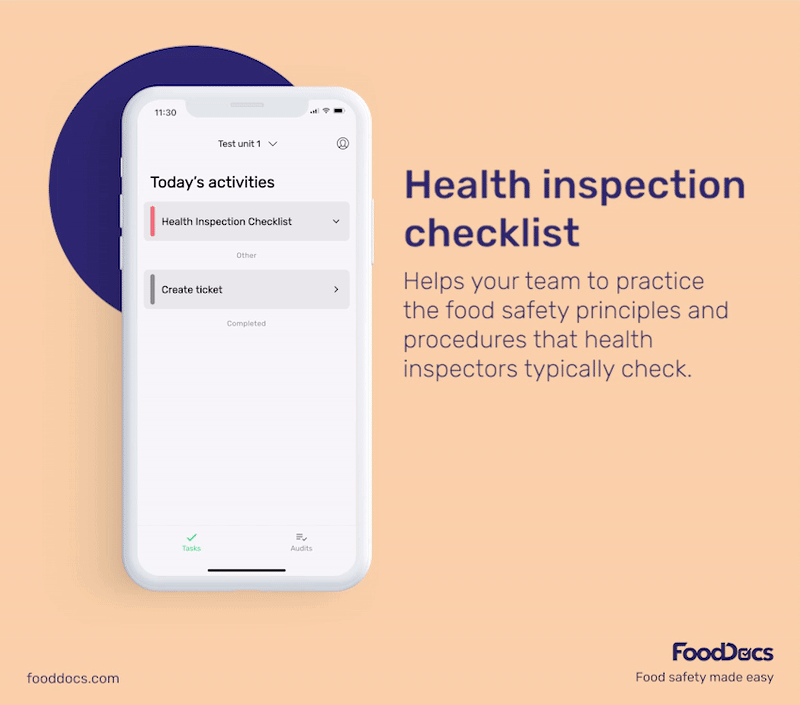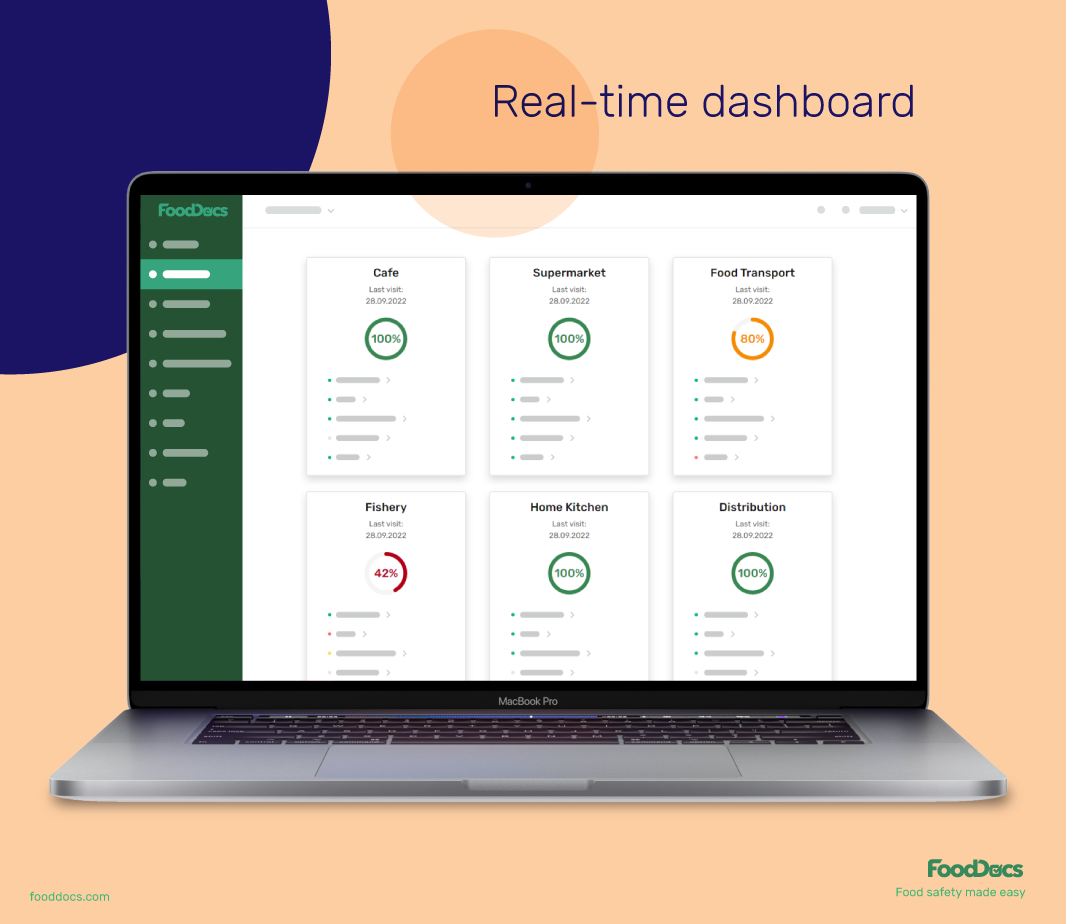Food inspection reports are the summary of an onsite evaluation of a food establishment.
For some food business owners, the sound of the words "food safety inspection" sends chills down their spines. Food inspections are a very important part of the food industry that assures the compliance of all food businesses with food safety laws.
No wonder food establishment owners get nervous because a lot is at risk if you fail food inspections. Based on the summary of your food handling practices in a food inspector's food inspection report, your business could face significant consequences or become appraised.
A food establishment inspection report is like a developed photograph of the food safety practices and management system observed at your restaurant on a specific day and time.
Key takeaways
-
Food inspection reports summarize onsite evaluations of food establishments.
-
These reports detail food safety practices, sanitary conditions, and the overall design of the facility.
-
Food inspections are proactive measures to uphold food safety standards and protect public health.
-
For business owners, food safety inspections can be stressful due to the high stakes involved, including the potential consequences of failing.
-
A food inspection report acts like a snapshot, capturing the food safety practices observed at a specific time during an inspection.
-
Good food safety management and preparation can mitigate the fear and consequences of inspections.
-
Food inspection reports are public records that can influence the reputation and operational status of a food business.
-
The reports help food safety agencies monitor and enforce compliance, ensuring that food businesses adhere to safety standards.
-
Effective food safety management systems are crucial for passing inspections and maintaining high standards.
-
FoodDocs' food safety management software can simplify your monitoring and traceability tasks, making food inspections much more expedient.
This is the main way for food safety agencies to keep all food establishments in check to prevent foodborne illness outbreaks and maintain a certain level of standard in the food industry.
Despite the dreaded stories of food inspections, there is nothing to be worried about if you are well-prepared anytime. As such, good food safety management and an appreciation of the importance of food safety inspections can save your food safety team from failing.

What is a food inspection report?
A food inspection report is a summary of your food safety operations on the day of a food inspection conducted in your restaurant. Any food establishment including restaurants, food retail stores, food trucks, deli stands, and cafeterias is subject to a food safety inspection.
This report contains information about your food safety practices around the establishment, sanitary conditions, storage practices, food safety management system, and the soundness of your food facility design.
After a food safety inspection, the designated food inspector will conclude the process with a report that contains the status of your operations and how sound are they. Additionally, they contain any violation that you may have had during the time of inspection. You will be given enough time to verify these violations or correct them for a reinspection.
Retail food inspection reports for other food establishments are accessible to the public and can be viewed at your local food safety agency website. You have to remember that a food safety report is not a final verdict until the whole process ends. If the inspector notes food code violations, you can still address them for a reevaluation.
What does the restaurant inspection report include?
A restaurant inspection report is a comprehensive document that contains basic information about your food establishment. It mainly aims to maintain a healthy food supply for the public and prevent hazardous food items from causing food illnesses and restaurant complaints.
The report categorizes your food business based on the risk level as well as the type of inspection performed. It is also composed of the various areas inspected by the local authority and the corresponding food establishment scores for each area.
Food inspection report sample

Restaurant inspection reports include the following items:
- Basic information about your food business. For proper identification, a food safety report would include information such as the name of your food business, location, types of food being served, capacity, name of the owner, the date and time of inspection, and zip code. The types of food establishment can be any of the following:
- Restaurants
- Coffee shops
- Fast-food establishments
- Retail food operations (e.g. grocery stores, convenience stores, or deli stands)
- Mobile food units (e.g. food trucks)
- Temporary food service events (e.g. carnivals and fairs)
- Institutional food establishments
All information provided for this report must be true and approved by the concerned authorities.
- Purpose of inspection. Restaurant inspections can be conducted for several reasons These reasons can be for a routine inspection, preoperational, reevaluation, complaint, HACCP certification, illness investigation, or other highly specific reasons. The designated food safety inspector is required to present the purpose of an inspection before conducting the evaluation.
- Risk classification. The risk classification indicates the associated risks to the type of food served in a food establishment. This information does not necessarily mean the level of sanitation and the safety of the facility. Classifications vary depending on the ruling state and the food safety laws in your local area. The classification may also be based on the types of food processing operations you have in the restaurant and your primary target consumers.
- Permit and certification numbers. These permits are required to properly operate within your location. Each permit has its unique permit number and contains the expiration dates. This is also the case for certifications such as the food safety manager's certificate and other training licenses.
- Violation item numbers. In case the food safety inspector notices any violations, these breaches can be classified as either critical or non-critical violations. These types of violations vary in degree and may merit different approaches. Non-critical violations may be addressed after the inspection as they would not cause a significant public health threat.
- Compliance status/ Rating score. Based on each area that will be inspected, the assigned food inspector can give you a numerical grade for each item or performance indicator such as compliant, non-compliant, not observed, not applicable, corrected during the inspection, or repeat violation.
- Prerequisite programs/HACCP principles. In general, a food safety inspection will evaluate your whole food safety management and compliance with food safety laws. These areas will include your knowledge of food safety, food handler awareness, the health of employees, hygiene practices, the presence of a consumer advisory, sanitation practices, and facility design.
- Comments. In some cases, the food inspector will make comments especially if there are special cases or noncompliance that need further explanations. These comments must be noted because they may contain important information on how to address any non-compliant areas.
- Signatories. At the bottom of the report is the name and signature of the assigned food safety inspector and the head of the department that issued the inspection.
These components of food establishment inspection reports may vary very slightly from one state to another but will most likely probably have the same contents. These reports were constructed to properly evaluate a food establishment's food safety management system and suggest any significant improvements needed. Getting low food scores or bad feedback does not mean outright closure for your food establishment. You will be given enough time to evaluate the report and either file for an appeal or address the non-compliant areas based on the food safety report.
Who inspects restaurants?
In the United States of America, restaurant inspections are carried out by local, country, and state food safety inspectors from agencies such as the U.S. Food and Drug Administration (FDA) and the United States Department of Agriculture Food Safety and Inspection Service (USDA FSIS). In the United Kingdom, environmental health officers from agencies such as the Food Standards Agency and local health units perform these food safety inspections. These food agencies conduct restaurant inspections to prevent foodborne illnesses from occurring and protect public health. States and county have their respective food agencies that regulate the food safety practices in their location.
Who writes a food inspection report?
Representatives from your local food safety agency, sometimes known as the environmental health officer, write the summary of a conducted food inspection. In some cases, the verdict of the inspection is handed out immediately right after a short discussion of the findings during the inspections. After a few days, a copy of the food inspection report will either be given to your food safety manager or will become available for request or access on your local food safety websites.
How do food inspection reports differ in different states?
While federal-level food safety agencies such as the FDA and USDA FSIS conduct food safety inspections, local state-based food agencies are also authorized to perform inspections within their regulatory jurisdiction. Each state in the U.S. also has its food safety laws that may differ from others. An example of these differences is the frequency of inspections.
The FDA is required to perform a food safety inspection every three years. On the other hand, the local state food agency of Oregon requires a food safety inspection to be conducted every six months, whereas food inspection reports in Florida for low-risk establishments are only conducted once a year.
Additionally, for the state of Florida, food inspection reports Florida has separate inspection guidelines for HACCP plans related to sprouting production. In other states such as Rhode Island, the frequency of submitting food inspection reports depend on the compliance history of the food service establishments.
A federal-level restaurant report also focuses more on reviewing records, whereas state-level agencies report more on food business operations in progress. Although the different levels of food safety inspection may vary in their food safety criteria and food establishment inspection reports summary, all inspection reports will still have common elements. The differences in federal- and state-level inspections require these agencies to coordinate with each other to prevent any conflicts.
A compilation of the different state- and county-level food safety agency websites is available.

How to ace every food inspection with FoodDocs' Food Safety Management Software
A food inspection report can significantly affect your food business operations. Depending on the results of the food inspection, you can either benefit from a good result or suffer bad publicity from critical violations.
The key to ticking all of the high scores from a food restaurant report is to have an efficient food safety management system (FSMS). Food establishment inspection reports will be made public by your local food authority. This means that all of your customers can see the status of your approach to food safety.
Your best bet to address all key food safety elements is to switch to our digital Food Safety Management System. In just an average of 15 minutes, you can get an automatically generated digital FSMS that is tailored to your food business and the food safety laws and codes in your location. You will be spending the first 15 minutes answering basic questions we have prepared that will allow us to get to know your food business better.


Signing up with us at FoodDocs gives you many advantages related to acing any food inspection:
- Never miss any task as we send you notifications for any food safety task or upcoming deadlines. Keep all of your audit and training certifications updated using this feature.
- Aside from our free food safety checklists, posters, and consumer advisory, signing up for our digital FSMS entitles you to automatically generated monitoring forms based on the operations of your food business. These monitoring forms are also automatically prefilled based on your previous data entries. All that is left to do for your food workers is to verify the logged data.
- You can also prepare for any food inspection as our system allows you to create digital checklists where you can input all key areas of your local food inspection routines and monitor them daily.
- Evaluate your food safety operations and pinpoint your weakest spot by reviewing your automatically generated food safety report through our real-time dashboard. This report is also accessible through our mobile application.


- Get access to our digital traceability system which will allow you to immediately address any food safety concern raised by consumers.
- Get all of your important documents in one place as we provide you with cloud storage where you can easily store, organize, and access them with no hassle. Prevent the overpiling of paper monitoring forms and switch to a more sustainable digital food safety management system.
- This digital FSMS was created by food safety experts with extensive knowledge of laws and regulations in the food industry. Our team provides you with efficient and fast customer support for any inquiries and concerns regarding your FSMS.
All monitoring forms, checklists, and advisories that we will automatically generate for you can be customized to further fit your specifications. We understand how some food businesses have their standards, operations, and even state-mandated features, which is why you can easily edit these documents.
Maintain compliance with federal- and state-level food safety regulations by signing up with us. Get ready for an awesome food inspection report to share with your team, partners, and customers with pride.
